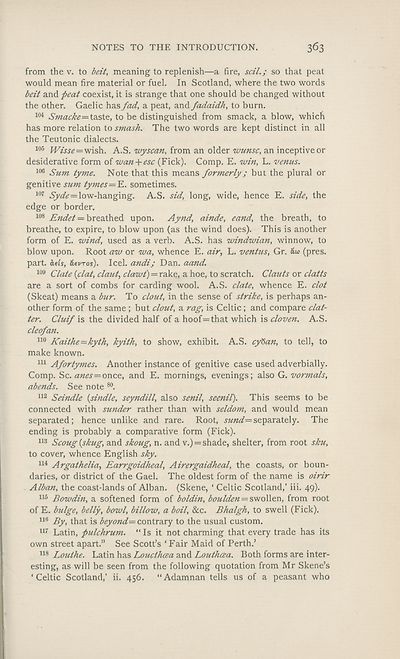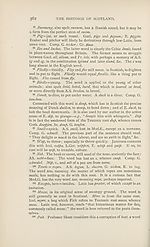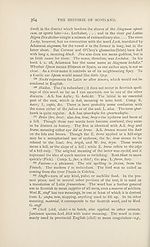Scottish Text Society publications > Old series > Historie of Scotland > Volume 1, 1888
(393) Page 363
Download files
Complete book:
Individual page:
Thumbnail gallery: Grid view | List view

NOTES TO THE INTRODUCTION.
363
from the v. to beit, meaning to replenish—a fire, scil.j so that peat
would mean fire material or fuel. In Scotland, where the two words
beit and feat coexist, it is strange that one should be changed without
the other. Gaelic has fad, a peat, and fadaidh, to burn.
104 Smacke—\.2L%\.t, to be distinguished from smack, a blow, which
has more relation to smash. The two words are kept distinct in all
the Teutonic dialects.
105 lVisse=v/ish. A.S. wyscan, from an older wunsc, an inceptive or
desiderative form of wan + esc (Fick). Comp. E. win, L. venus.
106 Sum tyme. Note that this means formerlyj but the plural or
genitive sum tymes=E. sometimes.
107 = low-hanging. A.S. sid, long, wide, hence E. side, the
edge or border.
108 Endet = breathed upon. Aynd, ainde, eand, the breath, to
breathe, to expire, to blow upon (as the wind does). This is another
form of E. wind, used as a verb. A.S. has windwian, winnow, to
blow upon. Root aw or wa, whence E. air, L. ventus, Gr. (pres,
part, acts, &fvros). Icel. andi; Dan. aand.
109 Clate (clat, claut, clawt) = rake, a hoe, to scratch. Clauts or clatts
are a sort of combs for carding wool. A.S. clate, whence E. clot
(Skeat) means a bur. To clout, in the sense of strike, is perhaps an¬
other form of the same; but clout, a rag, is Celtic; and compare clat¬
ter. Cluif is the divided half of a hoof=that which is cloven. A.S.
cleofan.
110 Kaithe=kyth, kyith, to show, exhibit. A.S. cySan, to tell, to
make known.
111 Afortymes. Another instance of genitive case used adverbially.
Comp. Sc. «««=once, and E. mornings, evenings; also G. vormals,
abends. See note 80.
112 Seindle (sindle, seyndill, also senil, seenil). This seems to be
connected with sunder rather than with seldom, and would mean
separated; hence unlike and rare. Root, separately. The
ending is probably a comparative form (Fick).
113 Scoug (skug, and skoug, n. and v.) = shade, shelter, from root sku,
to cover, whence English sky.
U4 Argathelia, Earrgoidheal, Airergaidheal, the coasts, or boun¬
daries, or district of the Gael. The oldest form of the name is oirir
Alban, the coast-lands of Alban. (Skene, ‘ Celtic Scotland,’ iii. 49).
116 Bowdin, a softened form of boldin, boulden = swollen, from root
of E. bulge, belly, bowl, billow, a boil, &c. Bhalgh, to swell (Fick).
116 By, that is contrary to the usual custom.
117 Latin, fulchrum. “ Is it not charming that every trade has its
own street apart.” See Scott’s ‘Fair Maid of Perth.’
118 Louthe. Latin has Loucthcea and Louthcea. Both forms are inter¬
esting, as will be seen from the following quotation from Mr Skene’s
‘ Celtic Scotland,’ ii. 456. “ Adamnan tells us of a peasant who
363
from the v. to beit, meaning to replenish—a fire, scil.j so that peat
would mean fire material or fuel. In Scotland, where the two words
beit and feat coexist, it is strange that one should be changed without
the other. Gaelic has fad, a peat, and fadaidh, to burn.
104 Smacke—\.2L%\.t, to be distinguished from smack, a blow, which
has more relation to smash. The two words are kept distinct in all
the Teutonic dialects.
105 lVisse=v/ish. A.S. wyscan, from an older wunsc, an inceptive or
desiderative form of wan + esc (Fick). Comp. E. win, L. venus.
106 Sum tyme. Note that this means formerlyj but the plural or
genitive sum tymes=E. sometimes.
107 = low-hanging. A.S. sid, long, wide, hence E. side, the
edge or border.
108 Endet = breathed upon. Aynd, ainde, eand, the breath, to
breathe, to expire, to blow upon (as the wind does). This is another
form of E. wind, used as a verb. A.S. has windwian, winnow, to
blow upon. Root aw or wa, whence E. air, L. ventus, Gr. (pres,
part, acts, &fvros). Icel. andi; Dan. aand.
109 Clate (clat, claut, clawt) = rake, a hoe, to scratch. Clauts or clatts
are a sort of combs for carding wool. A.S. clate, whence E. clot
(Skeat) means a bur. To clout, in the sense of strike, is perhaps an¬
other form of the same; but clout, a rag, is Celtic; and compare clat¬
ter. Cluif is the divided half of a hoof=that which is cloven. A.S.
cleofan.
110 Kaithe=kyth, kyith, to show, exhibit. A.S. cySan, to tell, to
make known.
111 Afortymes. Another instance of genitive case used adverbially.
Comp. Sc. «««=once, and E. mornings, evenings; also G. vormals,
abends. See note 80.
112 Seindle (sindle, seyndill, also senil, seenil). This seems to be
connected with sunder rather than with seldom, and would mean
separated; hence unlike and rare. Root, separately. The
ending is probably a comparative form (Fick).
113 Scoug (skug, and skoug, n. and v.) = shade, shelter, from root sku,
to cover, whence English sky.
U4 Argathelia, Earrgoidheal, Airergaidheal, the coasts, or boun¬
daries, or district of the Gael. The oldest form of the name is oirir
Alban, the coast-lands of Alban. (Skene, ‘ Celtic Scotland,’ iii. 49).
116 Bowdin, a softened form of boldin, boulden = swollen, from root
of E. bulge, belly, bowl, billow, a boil, &c. Bhalgh, to swell (Fick).
116 By, that is contrary to the usual custom.
117 Latin, fulchrum. “ Is it not charming that every trade has its
own street apart.” See Scott’s ‘Fair Maid of Perth.’
118 Louthe. Latin has Loucthcea and Louthcea. Both forms are inter¬
esting, as will be seen from the following quotation from Mr Skene’s
‘ Celtic Scotland,’ ii. 456. “ Adamnan tells us of a peasant who
Set display mode to: Large image | Zoom image | Transcription
Images and transcriptions on this page, including medium image downloads, may be used under the Creative Commons Attribution 4.0 International Licence unless otherwise stated. ![]()
| Publications by Scottish clubs > Scottish Text Society publications > Old series > Historie of Scotland > Volume 1, 1888 > (393) Page 363 |
|---|
| Permanent URL | https://digital.nls.uk/107373548 |
|---|
| Attribution and copyright: |
|
|---|
| Description | A collection of over 100 Scottish texts dating from around 1400 to 1700. Most titles are in Scots, and include editions of poetry, drama, and prose by major Scottish writers such as John Barbour, William Dunbar, Gavin Douglas, and George Buchanan. Edited by a key scholarly publisher of Scotland's literary history, and published from the late 19th century onwards by the Scottish Text Society. Available here are STS series 1-3. |
|---|

